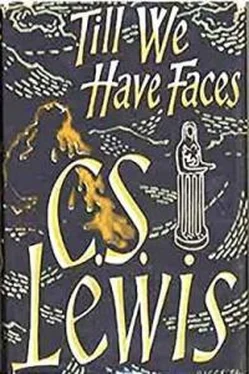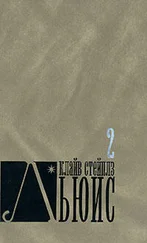“Enough,” said the judge.
There was utter silence all round me. And now for the first time I knew what I had been doing. While I was reading, it had, once and again, seemed strange to me that the reading took so long; for the book was a small one. Now I knew that I had been reading it over and over; perhaps a dozen times. I would have read it for ever, quick as I could, starting the first word again almost before the last was out of my mouth, if the judge had not stopped me. And the voice I read it in was strange to my ears. There was given to me a certainty that this, at last, was my real voice.
There was silence in the dark assembly long enough for me to have read my book out yet again. At last the judge spoke.
“Are you answered?” he said.
“Yes,” said I.
The complaint was the answer. To have heard myself making it was to be answered. Lightly men talk of saying what they mean. Often when he was teaching me to write in Greek the Fox would say, “Child, to say the very thing you really mean, the whole of it, nothing more or less or other than what you really mean; that’s the whole art and joy of words.” A glib saying. When the time comes to you at which you will be forced at last to utter the speech which has lain at the centre of your soul for years, which you have, all that time, idiot–like, been saying over and over, you’ll not talk about joy of words. I saw well why the gods do not speak to us openly, nor let us answer. Till that word can be dug out of us, why should they hear the babble that we think we mean? How can they meet us face to face till we have faces?
“Best leave the girl to me,” said a well–known voice. “I’ll lesson her.” It was the spectre which had been my father.
Then a new voice spoke from beneath me. It was the Fox’s. I thought he too was going to give some terrible evidence against me. But he said, “Oh Minos, or Rhadamanthus, or Persephone, or by whatever name you are called, I am to blame for most of this, and I should bear the punishment. I taught her, as men teach a parrot, to say ‘Lies of poets’, and ‘Ungit’s a false image’. I made her think that ended the question. I never said, too true an image of the demon within. And then the other face of Ungit (she has a thousand) … something live anyway. And the real gods more alive. Neither they nor Ungit mere thoughts or words. I never told her why the old Priest got something from the dark House that I never got from my trim sentences. She never asked me (I was content she shouldn’t ask) why the people got something from the shapeless stone which no one ever got from that painted doll of Arnom’s. Of course, I didn’t know; but I never told her I didn’t know. I don’t know now. Only that the way to the true gods is more like the House of Ungit … oh, it’s unlike too, more unlike than we yet dream, but that’s the easy knowledge, the first lesson; only a fool would stay there, posturing and repeating it. The Priest knew at least that there must be sacrifices. They will have sacrifice; will have man. Yes, and the very heart, centre, ground, roots of a man; dark and strong and costly as blood. Send me away, Minos, even to Tartarus, if Tartarus can cure glibness. I made her think that a prattle of maxims would do, all thin and clear as water. For of course water’s good; and it didn’t cost much, not where I grew up. So I fed her on words.”
I wanted to cry out that it was false, that he had fed me not on words but on love, that he had given, if not to the gods, yet to me, all that was costliest. But I had not time. The trial, it seemed, was over.
“Peace,” said the judge. “The woman is a plaintiff, not a prisoner. It is the gods who have been accused. They have answered her. If they in turn accuse her, a greater judge and a more excellent court must try the case. Let her go.”
Which way should I turn, set up on that pillar of rock? I looked on every side. Then, to end it, I flung myself down into the black sea of spectres. But before I reached the floor of the cavern one rushed forward and caught me in strong arms. It was the Fox.
“Grandfather!” I cried. “But you’re real and warm. Homer said one could not embrace the dead … they were only shadows.”
“My child, my beloved,” said the Fox, kissing my eyes and head in the old way. “One thing that I told you was true. The poets are often wrong. But for all the rest—ah, you’ll forgive me?”
“I to forgive you, Grandfather? No, no, I must speak. I knew at the time that all those good reasons you gave for staying in Glome after you were a freeman were only disguises for your love. I knew you stayed only in pity and love for me. I knew you were breaking your heart for the Greeklands. I ought to have sent you away. I lapped up all you gave me like a thirsty animal. Oh, Grandfather, Ansit’s right. I’ve battened on the lives of men. It’s true. Isn’t it true?”
“Why, child, it is. I could almost be glad; it gives me something to forgive. But I’m not your judge. We must go to your true judges now. I am to bring you there.”
“My judges?”
“Why, yes, child. The gods have been accused by you. Now’s their turn.”
“I cannot hope for mercy.”
“Infinite hopes—and fears—may both be yours. Be sure that, whatever else you get, you will not get justice.”
“Are the gods not just?”
“Oh no, child. What would become of us if they were? But come and see.”
He was leading me somewhere and the light was strengthening as we went. It was a greenish, summery light. In the end it was sunshine falling through vine leaves. We were in a cool chamber, walls on three sides of us, but on the fourth side only pillars and arches with a vine growing over them on the outside. Beyond, and between, the light pillars and the soft leaves I saw level grass and shining water.
“We must wait here till you are sent for,” said the Fox. “But there is plenty here that’s worth studying.”
I now saw that the walls of the place were all painted with stories. We have little skill with painting in Glome, so that it’s small praise to say they seemed wonderful to me. But I think all mortals would have wondered at these.
“They begin here,” said the Fox, taking me by the hand and leading me to part of the wall. For an instant I was afraid that he was leading me to a mirror as my father had twice done. But before we came near enough to the picture to understand it, the mere beauty of the coloured wall put that out of my head.
Now we were before it and I could see the story it told. I saw a woman coming to the river bank. I mean that by her painted posture I could see it was a picture of one walking. That at first. But no sooner had I understood this than it became alive, and the ripples of the water were moving and the reeds stirred with the water and the grass stirred with the breeze, and the woman moved on and came to the river’s edge. There she stood and stooped down and seemed to be doing something—I could not at first tell what—with her feet. She was tying her ankles together with her girdle. I looked closer at her. She was not I. She was Psyche.
I am too old, and I have no time, to begin to write all over again of her beauty. But nothing less would serve, and no words I have would serve even then, to tell you how beautiful she was. It was as though I had never seen her before. Or had I forgotten … no, I could never have forgotten her beauty, by day or by night, for one heartbeat. But all this was a flash of thought, swallowed up at once in my horror of the thing she had come to that river to do.
“Do not do it. Do not do it,” I cried out; madly, as if she could hear me. Nevertheless she stopped, and untied her ankles and went away. The Fox led me to the next picture. And it too came alive, and there in some dark place, cavern or dungeon, when I looked hard into the murk I could see that what was moving in it was Psyche; Psyche in rags and iron fetters, sorting out the seeds into their proper heaps. But the strangest thing was that I saw in her face no such anguish as I looked for. She was grave; her brow knitted as I have seen it knitted over a hard lesson when she was a child (and that look became her well; what look did not?). Yet I thought there was no despair in it. Then of course I saw why. Ants were helping her. The floor was black with them.
Читать дальше











